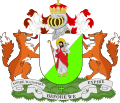LGBT rights in New Eiffel
| LGBT rights in the Principality of New Eiffel | |
|---|---|
 Unofficially used pride flag of New Eiffel | |
| Same-sex sexual activity legal? | Legal (since 2018) |
| Gender identity/expression | Legal gender change not allowed |
| Recognition of relationships | Civil unions recognised (since 2019) |
| Adoption | Yes (since 2018) |
| Military service | Legal |
| Discrimination protections | Freedom of speech, no protection against any forms of discrimination |
Laws concerning LGBT (lesbian, gay, bisexual, and transgender) rights in the Principality of New Eiffel are often disputed. Despite a growing government tolerance of LGBT rights, as well as LGBT persons having equal rights to that of every citizen, LGBT persons still often face social challenges not experienced by non-LGBT persons, and transgender persons cannot change one's gender. Being openly LGBT is generally socially acceptable.
Since December 2019, there has been a growing support for LGBT rights. The age of consent remains 18, regardless of sexual orientation, and LGBT persons are also allowed to openly serve in the military, and have been since the creation of the law in the Kingdom of New Finland. The Constitution guarantees the right to freedom of speech, and as such LGBT persons have no protection against any types of verbal discrimination, though anti-discrimination laws in employment are in force. Pride festivals and activism is legal, as long as the practises comply with the law.
New Eiffel scored a 5 out of 15 in Statistic Fire's 2019 LGBT Rights Index, indicating it is "moderately LGBT friendly". New Eiffel scored a 8 out of 20 in the 2020 Survey indicating it is "relatively LGBT friendly", a large improvement from its previous ranking.
Transgender rights
Laws regarding transgender rights are often very disputed, and some are up for interpretation. Transgender persons cannot legally change one's gender, even if they undergo gender reassignment surgery. Calling yourself and asking others to call you by your preferred pronoun, including a non-binary pronoun, is completely within the law. Formerly changing one's own gender on online forms and government censuses was punishable by fines, also it is no longer enforced and the law is de facto no longer in practice.
De facto transgender persons later applying for citizenship after transitioning, even if it is illegal in one's own country, will have their preferred gender recognised by the government.
In government
Parliament will typically use a person's preferred pronouns, including non-binary pronouns. Other members of parliament are not required to use a person's preferred pronouns, however almost every member has chosen to do so, as to pertain to decorum. Some parliament members may be less tolerant of using non-binary pronouns.
Law enforcement will always refer to one by their biological gender in official documents.[citation needed]
History
Sexuality
Homosexual rights
This section is empty. You can help by adding to it. |
Bisexual rights
This section is empty. You can help by adding to it. |
Asexual rights
New Eiffel was given a "C" grade by the Micronational Organisation for Asexual Visibility on asexual rights in July 2020, the MOAV citing "New Eiffel has moderate support and protection for the the rights of gender and sexual minorities, but this protection is limited."
Pansexual rights
Gender identity, third gender theory and lager sexualities are frequently debated topics, and as such pansexuals have limited rights compared to that of bisexuals.
Viewpoints of political parties
| Party | Sexuality rights[a] | Intersex rights | Transgender rights | Anti-discrimination | Status | Data |
|---|---|---|---|---|---|---|
| Labour Party | For | For | For | For | Ruling party | 2020 |
| The Coalition | For | For | For | Would hold a referendum (as of 2019 interview) | Second party | 2019 |
| Yellow Party | For | Unknown | Against | Against | Third-party | 2020 |
| The Orange Party | For | Against | For | Against | Third-party | 2019 |
Public opinion
The majority of New Eiffelic citizens are in favour of LGBT rights, however most oppose certain aspects such as recognition of same-sex couples and transgender rights.
Marriage
Currently marriages can longer be preformed. Formerly, it was exclusively available to opposite-sex couples and was legally recognised in the forms of both civil and religious marriage. Same-sex marriages remained unrecognised, however overseas same-sex couples are de facto governmentally recognised. New Eiffel did however have recognition of same-sex couples (e.g. civil unions).
Adoption and family planning
Adoption by same-sex couples is legal. Lesbians and their partners (both civil and de facto) have equal access to legal presumptions of parentage in cases of in vitro fertilisation (IVF) or assisted/self insemination (other than at home) from the moment the child is born, although this is not practiced in New Eiffelic territory. The law also allows both partners to be identified on the child's birth certificate by the words "parent".
Conversion therapy
Conversion therapy is illegal, and has been since the Kingdom of New Finland, New Eiffel's predecessor state, outlawed it in 2018.
Gender identity
This section is empty. You can help by adding to it. |
Intersex rights
This section is empty. You can help by adding to it. |
Media and culture
The ONERB treats LGBT romance, sexual references and sex the same way when classifying films as it does for heterosexual romance or sexual scenes. The Amalgamated Film Rating Board does the same.
History
This section is empty. You can help by adding to it. |
LBGT demographics
Summary table
The following is a table summarising key points:
Notes
- ↑ Homosexaulity, bisexuality and asexuality.

